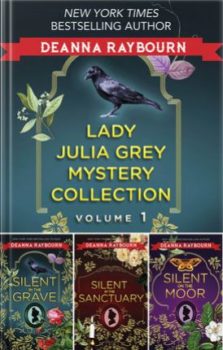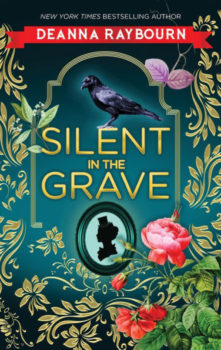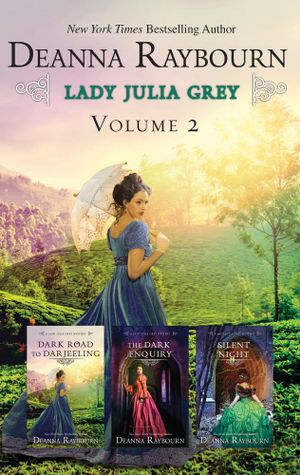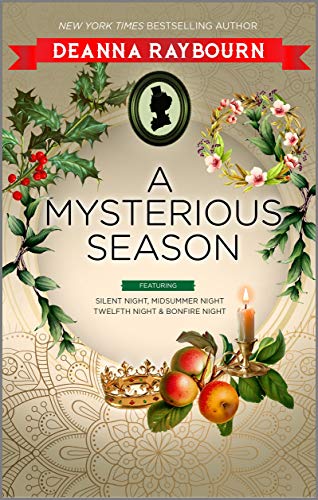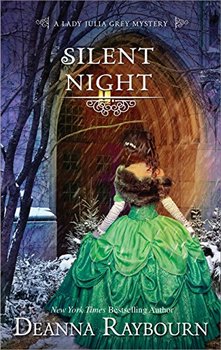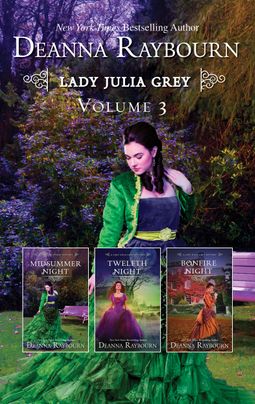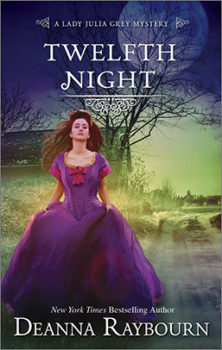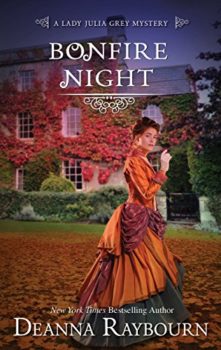
Lady Julia Grey Mysteries #2
August 12, 2019
Silent In The Sanctuary
Join Lady Julia Grey on her next investigation in book 2 of the acclaimed historical mystery series only from New York Times bestselling author Deanna Raybourn.
Fresh from a six-month sojourn in Italy, Lady Julia returns home to Sussex to find her father’s estate crowded with family and friends. Much to her surprise, the one man she had hoped to forget—the enigmatic and compelling Nicholas Brisbane—is among her father’s houseguests…and he is not alone. Not to be outdone, Julia shows him that two can play at flirtation and promptly introduces him to her devoted, younger, titled Italian count.
But the homecoming celebrations quickly take a ghastly turn when one of the guests is found brutally murdered in the chapel. Lady Julia resumes her unlikely and deliciously intriguing partnership with Nicholas Brisbane, setting out to unravel a tangle of deceit before the killer can strike again.
Originally published December 2007 in trade paperback, February 2009 in mass market paperback and August 2015 in eBook.
“Well, I suppose that settles it. Either we all go home to England for Christmas or we hurl ourselves into Lake Como to atone for our sins.”
I threw my elder brother a repressive look. “Do not be so morose, Plum. Fathers only really angry with Lysander,” I pointed out, brandishing the letter from England with my fingertips. The paper fairly scorched my skin. Fathers temper was a force of nature. Unable to rant at Lysander directly, he had applied himself to written chastisement with great vigour.
“The rest of us can go home easily enough,” I said. “Just think of it—Christmas in England! Plum pudding and snapdragon, mistletoe and wassail—”
“Chilblains and damp beds, fogs so thick you cannot set foot out of doors,” Plum put in, his expression sour. “Someone sobbing in the linen cupboard; Father locking himself in the study after threatening to drown the lot of us in the moat.”
“I know,” I said, my excitement rising. “Won’t it be wonderful?”
Plum’s face cracked into a thin, wistful smile. “It will, actually. I have rather missed the old pile—and the family, as well. But I shall be sorry to leave Italy. It has been an adventure I shall not soon forget.”
On that point we were in complete agreement. Italy had been a balm to me, soothing and stimulating at once. I had joined two of my brothers, Lysander and Eglamour—Plum to the family—after suffering the loss of my husband and later my home, and very nearly my own life. I had arrived in Italy with my health almost broken and my spirit in a sorrier state. Four months in a warm, sunny clime with the company of my brothers had restored me. And though the weather had lately grown chill and the seasons were turning inward, I had no wish to leave Italy yet. Still, the lure of family and home, particularly at Christmas, was strong.
“Well, who is to say we must return permanently? Italy shall always be here. We can go to England for Christmas and still be back in Venice in time for Carnevale.”
Plum’s smile deepened. “That is terribly cunning of you, Julia. I think living among Italians has developed a latent talent in you for intrigue.”
It was a jest, but the barb struck too close to home, and I lowered my head over my needlework. I had engaged in an intrigue in England; although, I had never discussed it with my brothers. There had been an investigation into my husband’s death, a private investigation conducted by an inquiry agent. I had assisted him and unmasked the killer myself. It had been dangerous, nasty work, and I told myself I was happy to be done with it.
But even as I plunged my needle into the canvas, trailing a train of luscious scarlet silk behind it, I felt a pang of regret—regret that my days were occupied with nothing more purposeful than those of any other lady of society. I had had a glimpse of what it meant to be useful, and it stung now to be merely decorative. I longed for something more important than the embroidering of cushions or the pouring of tea to sustain me.
Of my other regrets, I would not let myself think. I yanked at the needle, snarling the thread.
“Blast,” I muttered, rummaging in my work basket for my scissors.
“We are a deceptively domestic pair,” Plum said suddenly.
I snapped the threads loose and peered at him. “Whatever do you mean?”
He waved a hand. “This lovely villa, the fireside, both of us in slippers. I, reading my paper from England whilst you ply your needle. We might be any couple, by any fireside, placidly whiling away the darkening hours of an autumn eve.”
I glanced about. The rented villa was comfortably, even luxuriously appointed. The long windows of the drawing room overlooked Lake Como; although, the heavy velvet draperies had long since been drawn against the gathering dark. “I suppose, but—”
What I had been about to say next was lost. Morag, my maid, entered the drawing room to announce a visitor.
“The Count of Four-not-cheese.”
I gave her an evil look and tossed my needlework aside. Plum dashed his newspaper to the floor and jumped to his feet.
“Alessandro!” he cried. “You are a welcome sight! We did not expect you until Saturday.”
Morag did not move, and our visitor stepped neatly around her, doffing his hat and cape. They were speckled with raindrops that glittered in the firelight. He held them out to Morag who looked at him as though he had just offered her a dead animal. I rushed to take them.
“Alessandro, how lovely to see you.” I thrust the cape and hat at Morag. “Take these and brush them well,” I instructed. “And his name is Fornacci,” I hissed at her.
She gave me a shrug and a curl of the lip and departed, dragging the tail of Alessandro’s beautiful coat on the marble floor as she went.
I turned to him, smiling brightly. “Do come in and get warm by the fire. It has turned beastly out there and you must be chilled to the bone.”
He gave me a look rich with gratitude, and something rather more as well. Plum and I bustled about, plumping cushions and making him comfortable with a chair by the fire and a glass of good Irish whiskey. Alessandro had never tasted whiskey until making the acquaintance of my brothers, but had become something of a connoisseur in the months he had known them. To begin with, he no longer made the mistake of tossing his head back and drinking the entire glass at one gulp.
After a few minutes by the fire he had thawed sufficiently to speak. “It is so good to see you again,” he said, careful to look at Plum as well as myself when he spoke. “I am very much looking forward to spending Christmas with you here.” His English was terribly fluent, very much better than my Italian, but there was a formality that lingered in his speech. I found it charming.
Plum, who had poured himself a steady glass of spirits, took a deep draught. “I am afraid there has been a change in plans, old man.”
“Old man” was his favourite nickname for Alessandro, no doubt for its incongruity. Alessandro was younger than either of us by some years.
The young man’s face clouded a little and he looked from Plum to me, his silky dark brows knitting in concern. “I am not invited for Christmas? Shall I return to Firenze then?”
I slapped Plum lightly on the knee. “Don’t be vile. You have made Alessandro feel unwelcome.” It had been arranged that Alessandro would come to us in November, and we would all spend the holiday together before making a leisurely journey to Venice in time for Carnevale. There was no hope of such a scheme now. I turned to Alessandro, admiring for a moment the way the firelight licked at his hair. I had thought it black, but his curls shone amber and copper in their depths. I wondered how difficult it would be to persuade Plum to paint him.
“You see, Alessandro,” I explained, “we have received a letter from our father, the Earl March. He is displeased with our brother Lysander and wishes us all to return to England at once. We shall spend Christmas there.”
“Ah. How can one argue with the call of family? If you must return, my friends, you must return. But know that you will always carry with you the highest regard of Alessandro Fornacci.”
This handsome speech was accompanied by a courtly little bow from the neck and a noble, if pained, expression that would have done a Caesar proud.
“I have a better idea, and a very good notion it is,” Plum said slowly. “What if we bring Alessandro with us?”
I had just taken a sip of my own whiskey, and I choked slightly. “I beg your pardon, Plum?”
Alessandro raised his hands in a gesture I had seen many Italians employ, as if warding something off. “No, my friend, I must not. If your father is truly angry, he will not welcome an intruder at this time.”
“Are you mad? This is precisely the time to bring someone outside the family into the fold. It will keep him from killing Lysander outright. He will behave himself if we cart you back to England with us. The old man has peculiar ideas, but he is appallingly hospitable.”
“Plum, kindly do not refer to Father as ‘the old man.’ It is disrespectful,” I admonished.
Alessandro was shaking his head. “But I have not been invited. It would be a great discourtesy.”
“It would be a far greater discourtesy for Father to kill his own son,” Plum pointed out tartly. “And you have been invited. By us. Now I must warn you, the family seat is rather old-fashioned. Father doesn’t hold with new ideas, at least not for country houses. You’ll find no steam heat or even gaslights. I’m afraid it’s all coal fires and candles, but it really is a rather special old place. You always said you wanted to see England, and Bellmont Abbey is as English as it gets, dear boy.”
Alessandro hesitated. “If I may be so bold, why is his lordship so angry with Lysander? Surely it is not—”
“It is,” Plum and I chorused.
Just at that moment, sounds of a quarrel began to echo from upstairs. There was a shout and the unmistakable crash of breaking crockery.
“But the earl, he cannot object to Lysander’s marriage to so noble and lovely a lady as Violante,” Alessandro put in, quite diplomatically I thought.
Something landed with a great thud on the floor, shivering the ceiling and causing the chandelier above our heads to sway gently.
“Do you suppose that was one of them?” Plum inquired lightly.
“Don’t jest. If it was, we shall have to deal with the body,” I reminded him. Violante began to shriek, punctuating her words with tiny stamps of her heel from the sound of it.
“I wonder what she is calling him. It cannot be very nice,” I mused.
Alessandro gave an elegant shrug. “I regret, my understanding of Napolitana, it is imperfect.” He dropped his eyes, and I wondered if he understood more than politeness would allow him to admit.
“Probably for the best,” Plum remarked, draining the last of his whiskey.
“Do not finish off the decanter,” I warned him. “Lysander will want a glass or two when they have finished for the evening.”
“Or seven,” Plum countered with a twitch of his lip. I gave him a disapproving look. Lysander’s marital woes were not a source of amusement to me. I had endured enough of my own connubial difficulties to be sympathetic. Plum, however, wore a bachelor’s indifference. He had never said so, but I suspected his favorite brother’s defection to the married state had rankled him. They had travelled the Continent together for years, roaming wherever their interests and their acquaintance had directed them, exploring museums and opera houses and ruined castles. They wrote poetry and concertos and painted murals on the walls of ancient abbeys. They had been the staunchest companions until Lysander, having left his thirtieth birthday some years past, had spotted Violante sitting serenely in her uncles box at La Fenice. It was, as the Tuscans say, un colpo difulmine, a bolt of lightning.
It was also a bit misleading. Upon further investigation, Lysander discovered Violante was Neapolitan, not Venetian, and there was quite simply nothing about her that was serene. She carried in her blood all the warmth and passion and raw-boned energy of her native city Violante was Naples, and for a cool-blooded, cool-headed Englishman like Lysander the effect was intoxicating. He married her within a month, and presented Plum and me with a fait accompli, a sister-in-law who smothered us in kisses and heady jasmine perfumes. For my part, I found her charming, wholly unaffected if somewhat exhausting. Plum, on the other hand, was perfectly cordial and cordially perfect. Whenever Violante stepped from a carriage or shivered from the cold, Plum would offer her a hand or his greatcoat, bowing and murmuring a graciously phrased response to her effusive thanks. And yet always he watched her with the cool detachment one usually reserves for specimens at the zoological garden. I often thought there might be real fondness there if he could unbend a little and forgive her for coming so precipitously into our lives.
But Plum was nothing if not stubborn, and I knew a straightforward approach would only cause him to dig his heels into the ground like a recalcitrant pony. So I endeavored to distract him with little whims and treats, cajoling him into good temper in spite of himself.
And then we met Alessandro, or to be accurate, I met Alessandro, for he was a friend of my brothers of some years’ duration. Rome had been too hot, too noisy; altogether, too much for my delicate state when I first arrived in Italy. My brothers immediately decided to quit the city and embark on a leisurely tour to the north, lingering for a few days or even weeks in any particularly engaging spot, but always pushing on toward Florence. We settled comfortably in a tiny palazzo there, and I began to recover. My fire-roughened voice smoothed again, never quite as it had been, but not noticeably damaged. My lungs were strengthened and my spirits raised. Lysander felt comfortable enough to leave us to accept an invitation for a brief trip to Venice to celebrate the private debut of a friend’s opera. Plum pledged to watch over me, and Lysander departed, to return a month later after endless delays and a secret wedding, his voluble bride in tow.
Alessandro had kept us company while Lysander was away, guiding us to hidden piazze, revealing secret gardens and galleries no tourists ever crowded. He drove us to Fiesole in a beribboned pony cart, stopping to point out the most breathtaking views in that enchanted hilltop town, and introduced us to inns in whose flower-drenched courtyards we were served food so delicious it must have been bewitched. Plum always seemed to wander off, sketchbook in hand to capture a row of cypresses, stalwart and straight as a regiment, or the elegant curve of a si-gnorina’s cheek, distinctive as a goddess out of myth. Alessandro did not seem to mind. He talked to me of history and culture and we practiced our languages with each other, learning to speak of everything and nothing at all.”
© Reprinted by permission. All rights reserved.

back to Top
Deanna Raybourn, calling upon a captivating cast of characters, transports us into the complex and rarified world of the Victorian aristocracy. Dark deeds are afoot, as the March family and friends reunite for Christmas at the family estate in Sussex, only to find a murderer roaming its halls. The questions and discussion topics that follow will, we hope, enhance your enjoyment of this remarkable book.
- The relationship between Lady Julia Grey and Nicholas Brisbane remains an unconventional one. What are their long-term prospects for happiness together?
- How does Lady Julia resist the conventions of her time?
- Bellmont Abbey is a place with a long and interesting history. How does the setting contribute to the atmosphere of the book?
- The relationship between sisters is a recurring theme in this book. Compare the relationship between Julia and Portia with that of Lucy and Emma.
- Alessandro Fornacci offers Julia a different life than the one she is currently leading. Could she have been happy accepting his proposal?
- The Marches seem to have an overly romanticized view of Gypsy life. Discuss the ways in which the presence of Gypsies has an impact on the inhabitants of Bellmont Abbey.
- Several characters in the book—Ludlow, Sir Cedric, Lucian Snow–have experienced life-altering changes that have taken them out of the circumstances into which they were born. Have these changes made them better men or worse?
- Emma and Lucy were raised poor on the fringes of a wealthy, noble family. How has this perspective as outsiders looking in shaped their characters?
- Julia’s gift of the pearls to Magda is an unexpected and generous gesture. Was it the right thing to do? Could there be unexpected ramifications from giving such a gift?
- The story of Mariah Young gives the reader greater insight into Nicholas Brisbane’s early life. What impact has this had on him as an adult?
- Charlotte King is a thief, but an engaging one. What makes her sympathetic to the reader?
- Julia’s decision to let Charlotte King go means Nicholas has lost his chance at a title. Why might he have wanted one?
- Julia discovers Nicholas has risked his own life to help her father, sustaining a bullet wound to the shoulder in the process. What is the nature of his relationship with Lord March?
- How does Julia handle Plum’s infatuation with his sister-in-law? Is the advice she gives him the best advice she could give under the circumstances?
- Ludlow claims to have murdered Lucian Snow on Emma’s behalf. Were there other motives for his actions?
- Julia and Aunt Dorcas decide not to tell Lord March about Emma’s involvement in the murder of Lucian Snow. Was keeping this a secret, the right decision? How does the decision directly affect Emma, Lucy and Sir Cedric?
